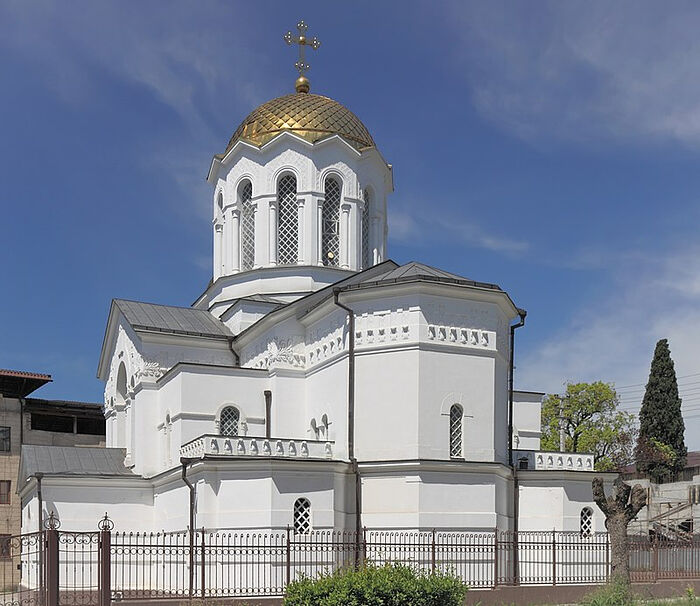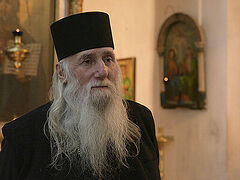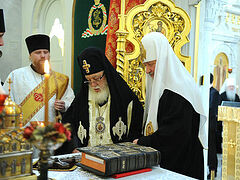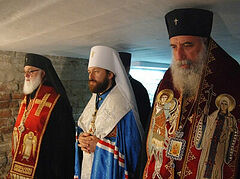Tbilisi, February 26, 2021
 Holy Annunciation Cathedral in Sukhumi, where Fr. Vissarion serves, is the only church still offering the services. Photo: Wikipedia
Holy Annunciation Cathedral in Sukhumi, where Fr. Vissarion serves, is the only church still offering the services. Photo: Wikipedia
The recent decision of Fr. Vissarion Apliaa of the “Abkhazian Orthodox Church” to suspend the services there in a bid to force His Holiness Patriarch Kirill to define the status of the self-declared autonomous church was both unexpected and incomprehensible, believes the Georgian Orthodox Church.
Although Fr. Vissarion declared that the Abkhazian Church was not and cannot be part of the Georgian Church, he is, in fact, a cleric of the Georgian Orthodox Church, commented His Eminence Metropolitan Andria of Gori and Aten, reports the Foreign Affairs Department of the Georgian Church.
Abkhazia is recognized as the canonical territory of the Georgian Orthodox Church by the Russian and the entire Orthodox Church.
Although Fr. Vissarion declared the Diocese of Abkhazia autonomous in 2009, the Georgian Church has never placed canonical sanctions upon him, so as not to deprive the faithful there of the Holy Mysteries.
“Unfortunately, politics is having an impact,” Met. Andria said, expressing hope that the Russian Church, “which has clearly and emphatically recognized the canonical territory of the Georgian Church,” will neither recognize the self-declared autonomous status of the “Abkhazian Orthodox Church” nor receive it into the Russian Church.
Met. Andria also emphasized that the Georgian Church has repeatedly appealed to the Russian Church that all clerics who visit Abkhazia, even if temporarily, first receive a blessing from His Holiness Catholicos-Patriarch Ilia II of Georgia.
While Abkhazia ecclesiastically belongs to the Georgian Church today, the political situation is such that Georgian clergy are not allowed to enter the country and pastor their flock there, creating a difficult situation for all involved.
In another post, the Georgian Church’s Foreign Affairs Department states that Fr. Vissarion is “grossly distorting Abkhazian ecclesiastical history.” They also recall that the head of the “Abkhazian Orthodox Church” was ordained by Pat. Ilia, not within the Russian Church.
Thus, as all Local Orthodox Churches solve all ecclesiastical problems within their own recognized canonical boundaries themselves, the issue of Fr. Vissarion and his parishes is a matter for the Georgian, not the Russian Church to resolve, the statement underlines.
The Department then explains that Abkhazia has historically been part of Georgia both politically and ecclesiastically, and that the Catholicoses of Likht-Imereti and Abkhazia even celebrated the Divine services in Georgian because it was a Georgian population living there.
After the autocephaly of the Georgian Church was abolished by the Russian Empire in the 19th century, the Diocese of Abkhazia was still served by Georgian priests, the statement continues. After the restoration of its autocephaly in 1917, the Georgian Church established the Diocese of Tskhum-Abkhazia, and from 1921 to 1993, this diocese was always under the jurisdiction of the Georgian Orthodox Church. Following the events of 1993 and 2008, the clergy were finally expelled from Abkhazia.
The Georgian Church then notes that Patriarch St. Tikhon did not recognize the renewed autocephaly of the Georgian Church and “trying to weaken its position in Abkhazia,” sent a bishop to serve there. However, the Russian Holy Synod recognized the Diocese of Tskhum-Abkhazia as an integral part of the Georgian Church when it recognized its restored autocephaly in 1943.
The Russian Church has not publicly responded to Fr. Vissarion’s demand, though it has declined to receive him into the ranks of the Russian clergy many times before.
Follow us on Facebook, Twitter, Vkontakte, Telegram, WhatsApp, Parler, MeWe, and Gab!



